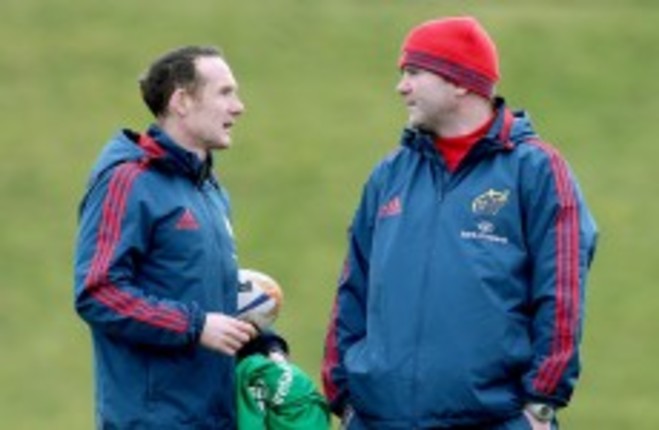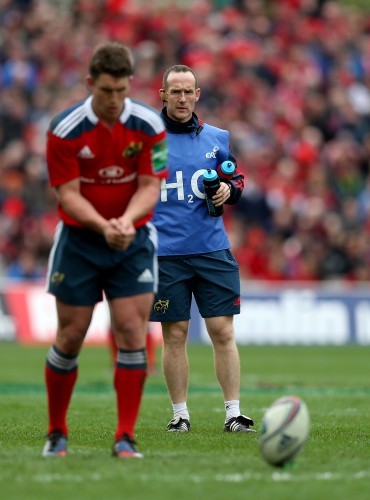THE FACT THAT IAN Costello recently returned to Ireland from a professional trip to Australia speaks volumes of his mindset as a coach.
The Munster assistant visited Super Rugby franchises the Rebels and the Brumbies, as well as rugby league side Melbourne Storm and Aussie rules outfit Collingwood, looking to enhance the way he coaches.
He has undertaken similar trips to South Africa and the UK in recent years, searching for the marginal gains in his own work that he strives to bring about in the skills of the players he works with at Munster.
“I’m always trying to be better next month than I am this month. You have your core principles and foundations of what you believe in, but you’re always looking for that little bit of an extra edge, whether it’s technical, tactical or your delivery,” says Costello.
“I’ve drawn on a huge amount of influences, whether it’s rugby coaches or coaches from other sports. You read about them, you take opportunities to speak to them.
It’s a process, something you have to live, something you have to believe in. I think you have to be internally motivated to keep trying to be better. That’s what you expect from players and you have to have those same expectations of yourself.”
Costello’s route to his role as assistant coach to Anthony Foley is one less taken, given that he did not play professional rugby. 10 years as an AIL out-half gave him plentiful game-based awareness, but his pathway is unique.
His coaching journey started at the age of 21 with the University of Limerick men’s freshers’ team, when a bad hip injury sidelined him from his own playing pursuits.
The early coaching bug stuck with Costello after he learned that he got “a huge kick out of seeing players improve.” As his playing days with UL Bohs neared an end, he continued to learn the trade with Ard Scoil Rís’ senior team and Bohs’ women’s side, before taking over as head coach of the Limerick club’s senior men’s team.
[image alt="Ian Costello" src="http://cdn.thejournal.ie/media/2014/07/ian-costello-3-630x404.jpg" width="630" height="404" class="alignnone" /end]
His first ‘in’ with the Munster set-up was as an Elite Development Officer – working closely with academy players – before an IRFU edict stated that a new role as Director of Rugby with Bohs meant he could not continue with the province.
“There was a stance that if you were doing that job [with Munster], you couldn’t coach at club level. So I had to make a pivotal decision in my career to date and decide which one of those to do.”
Three years later, and having gained invaluable experience in “preparing a team, the multi-faceted approach you have to take to getting a team to perform at the end of a week,” Costello was re-integrated into the Munster fold as a part-time skills coach under Tony McGahan.
A season later, he joined the province full-time as skills specialist and ‘A’ team coach, before taking on an expanded role under Rob Penney last season that included “set-piece defence, part of our phase attack and our exit strategies” and then becoming assistant coach in the brand-new all-Irish ticket under Foley this summer.
Costello is keen to point out the excellent IRFU pathways that have made his journey possible, with the likes of Stephen Aboud and Colin Moran having played important roles along the way in his development.
Brian Walsh, formerly Cork Con’s head coach, is the other assistant under ex-No. 8 Foley, focusing on attack while Costello oversees the defence and kicking. With Mick O’Driscoll and Jerry Flannery also involved, Munster are looking at a very new approach.
“We all know each other, we’ve all worked with each other before. Our philosophies are very similar, very aligned. Our roles have headings and a certain focus, but we’ll be very much integrated in how we prepare.
“Micko is exceptional around line-outs and restarts, plus he’ll be head coach of the ‘A’ side. Jerry is an incredibly driven, motivated individual, with his main main focus on scrums, but we’ll all have input into all areas.
[image alt="Rob Penney and Ian Costello" src="http://cdn.thejournal.ie/media/2014/07/rob-penney-and-ian-costello-630x449.jpg" width="630" height="449" class="alignnone" /end]
“That’s the kind of environment Axel wants to create. We want to challenge each other, be open, very well prepared and organised, giving ourselves the best chance of success.”
Turning to the major area where he has been designated responsibility, namely defence, Costello is keen to point out the how of what he will look to bring.
“I have a huge belief in having strong structures in place. How I coach those is just as important as what I coach. For me, regardless of what area of the game I look after, I try to keep the same principles.
“For me, it’s about being really, really prepared, having your knowledge, but then having a narrow focus on the key areas you want to change so players get incredible clarity in what they’re doing.
If they’ve got clarity, the chances are they’re going to bring a huge amount of intensity, because you’ve freed up the complexity of the decisions they have to make.”
With those key points established, Costello pinpoints two aspects of Munster’s defence, acknowledging that this is an area where the province have already enjoyed success under Foley in recent seasons, but underlining that improvements can always be made.
“I wanted to identify what makes a difference; looking at an attack, what makes a difference for the attacking team? The two things that we keep coming back to are advantage line and speed of ball.
“If you look at the top teams in the world, they regularly win the advantage line and they regularly get quick ruck ball.
“So a huge amount of our focus is going to be about taking away that advantage line and controlling rugby speed; essentially, killing momentum and taking away their initiative in attack.
“How do we take away the advantage line? We’ve got to have structures that enable us to have line speed and have excellent technique around the tackle area, taking away people’s legs, taking away their momentum.
“Then we have to look at the tackle contest; can we make good decisions about what our actions are going to be? Are we going to try and win the ball? Are we going to go through and take space? Are we going to leave it and target the next phase?”
When asked to describe what a successful Munster defence will look like under his watch, Costello’s answer echoes the words of the great American sports coaches John Wooden and Bill Walsh, whose work the Dingle native has read extensively.
This isn’t intended as a cop-out, because it’s something I firmly believe. Of course I want to have the best defensive record, but if I focus on that and put my energy into that, I think it’s counter-productive.
“What I’m going to focus on and what I’m putting my energy into are the systems and processes, making sure they are at the best standard they can possibly be, making sure we’re the best we can possibly be.
“Of course I’m going to look at stats, of course I’m going to look at where we are relative to others.
“But I’m also going to be looking from a proactive point of view; how many points does our defence generate? How many times do we turn over the ball? How often do we get possession back?
[image alt="Ian Costello" src="http://cdn.thejournal.ie/media/2014/07/ian-costello-5-630x425.jpg" width="630" height="425" class="alignnone" /end]
“It’s not always going to be as black and white as what the ‘points against’ figure looks like.”
Costello also has control over Munster’s exit strategies – how they clear the ball from their defensive zone – and will look to build “a collective understanding” that “sometimes the best way to exit isn’t always to kick immediately.”
His passion for the game comes across clearly, as does his desire to play a role in improving Munster as a team. He believes that Munster are on the brink of major achievements after two consecutive Heineken Cup semi-finals in the last two seasons.
His goal, like his fellow coaches, is to guide the players to the improvements needed to take the next step.
“We’re talking about marginal gains at this level. Somebody gets to 85 or 90% of their capacity pretty early in their career, but where the real fun or challenge as a player and a coach, if you’re motivated, is getting from 90 to 100%.”


